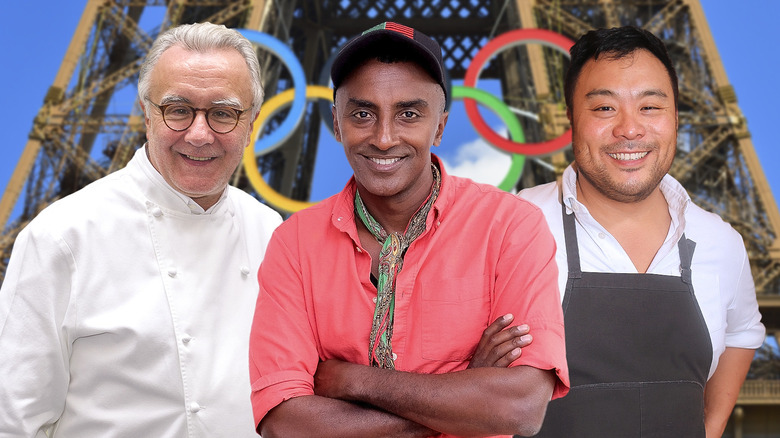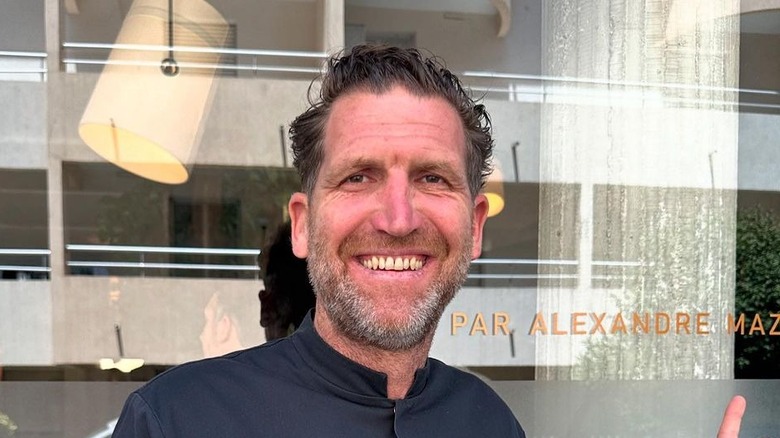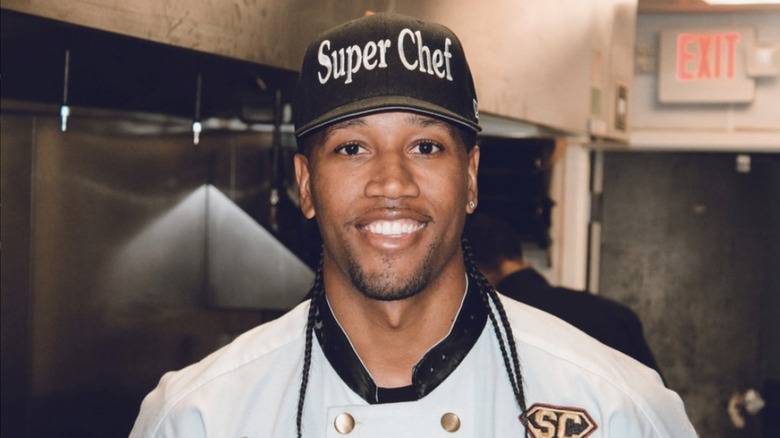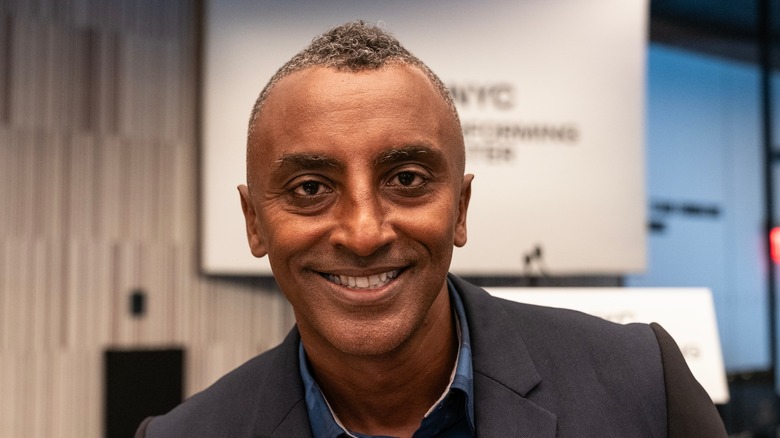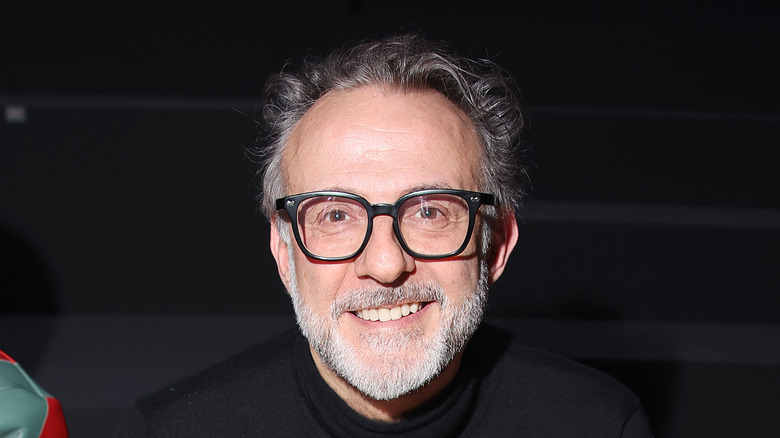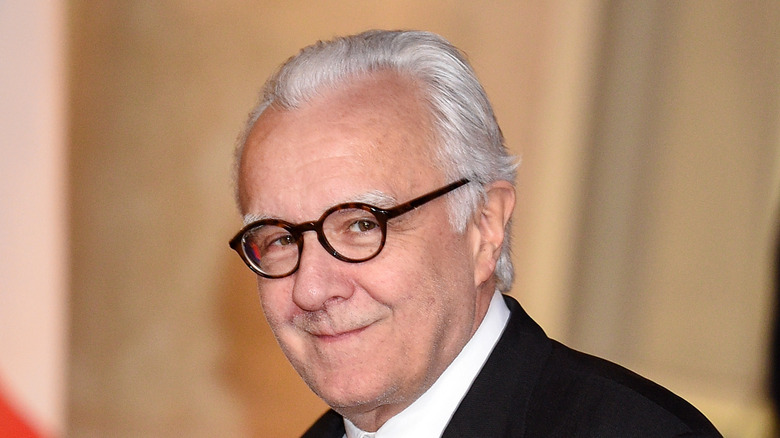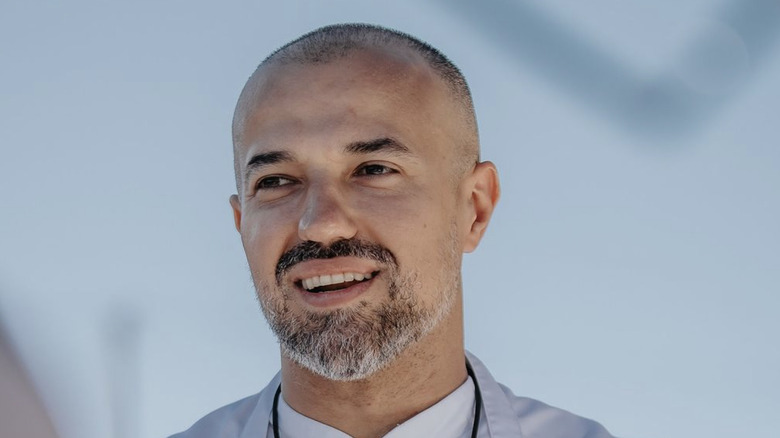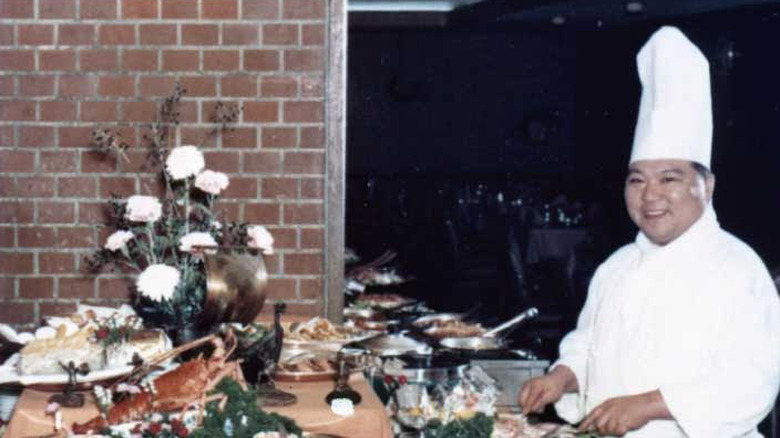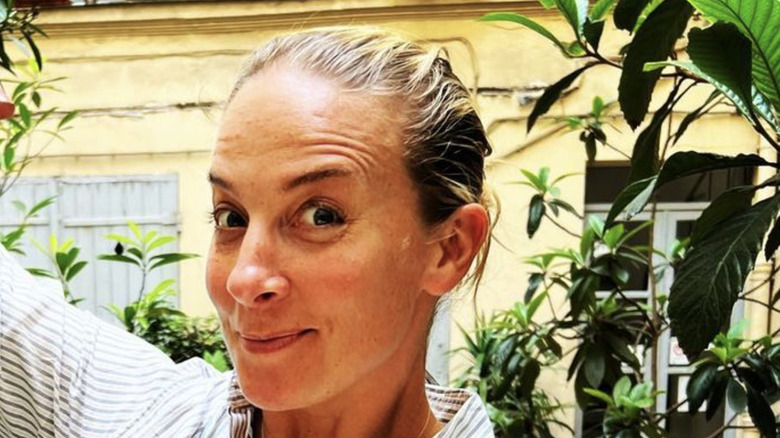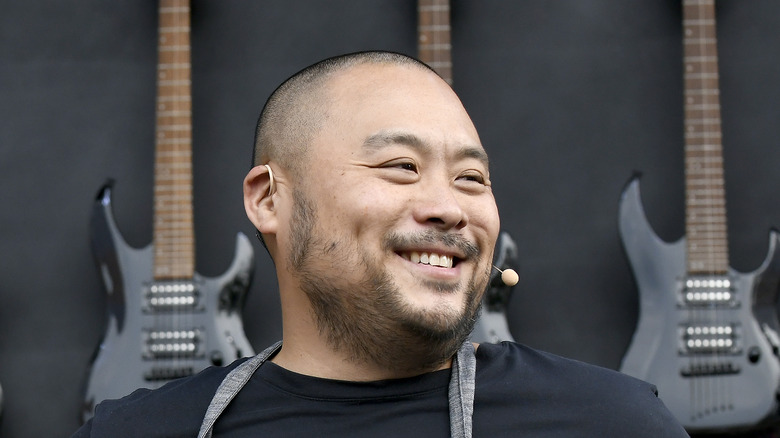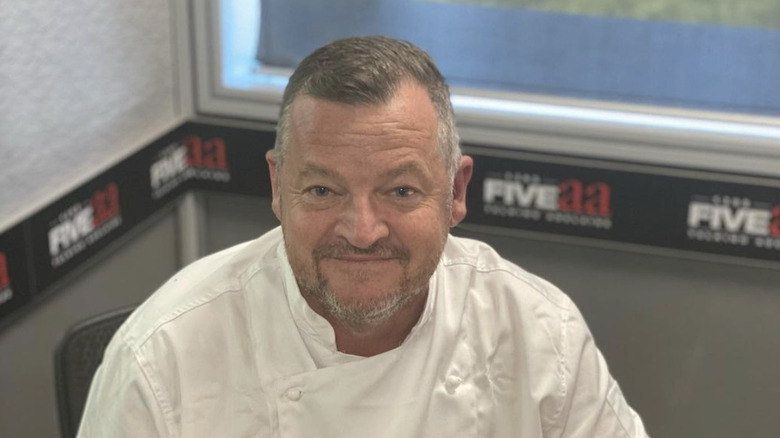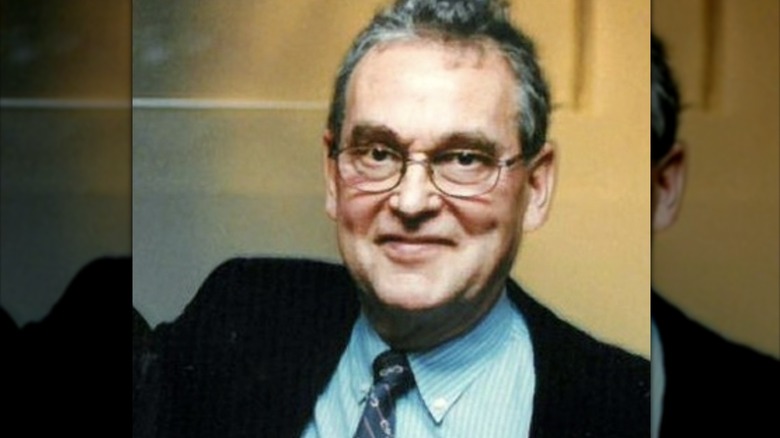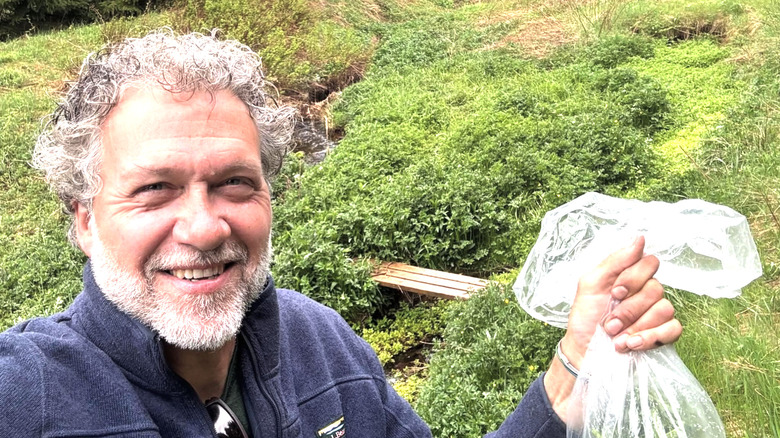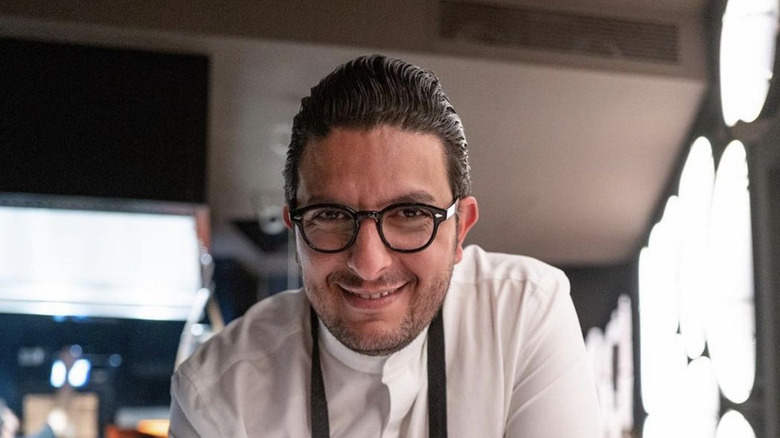Celebrity Chefs That Have Cooked (And Will Cook) At The Olympic Games
French cooking has been at the pinnacle of haute cuisine for centuries — and the 2024 Olympic organizers have set out to prove why. With the help of some of France's most respected chefs, the Parisian Olympic Village will serve the most sophisticated and sustainable menu the Games have ever seen, but it's not the first time a celebrity chef has cooked at the Olympic Games.
Some of the celeb chefs on this list might not be familiar to you, but like many of the athletes that compete in the Olympics, these chefs represent the top of their field. A few entered the Olympic kitchen before hitting the big time, while others brought a more experienced vision to the table. In recent years, celebrity chefs have used the Olympics as a way to spread awareness about the socioeconomic and environmental impacts of food. This shift really gained ground when a world-class chef at 2016's Rio Games sought to fix an unignorable problem (more on that later).
The Olympic Games were forged on athletes' talent, fearlessness, and tremendous drive. World-class chefdom is approached in much the same way. Let's take a closer look at the experiences of celebrity chefs who have stepped into the Olympic kitchen in the past, and those who are set to make a stunning Olympic Games debut in summer 2024.
Alexandre Mazzia
Michelin Stars are Alexandre Mazzia's thing. The French chef has won three of them for his work at AM Par Alexandre Mazzia, the Marseille eatery he opened in 2014. In preparation for the Olympics, which kick off on July 26th, Mazzia formulated around 20 recipes to be prepared and served at the Olympic Village in Saint Denis, a suburban region on the borders of Paris. Many of Mazzia's recipes won't contain meat — no surprise considering the Paris Olympics' pledge that 60% of the food served at the Olympic Village will be plant-based, in an effort to promote environmental sustainability.
A lack of meat hardly hinders Mazzaia's creative culinary process. After all, he told Country & Town House that his food is, "a glimpse of my soul" and, "My cuisine today is not the one of yesterday and will be different from the one of tomorrow." As far as the Paris Olympics are concerned, Mazzia will be at the Village premises Sundays and Mondays to serve his latest offerings, including his signature dish: whipped chickpeas and smoked seafood broth topped with beets, peas, and verbena petals. To craft his Olympic menu, Mazzia — a former professional basketball player — focused on foods that would replenish the athletes' minds and bodies while also keeping the dishes spirited, approachable, and a little unexpected.
Darnell Ferguson
Before becoming a familiar face on cooking competitions and other food-focused TV shows, Darnell Ferguson was a young culinary upstart in Louisville, Kentucky struggling to make ends meet. While attending culinary school, the would-be television star and restaurant owner was one of roughly 20 student chefs selected to cook for Team U.S.A. during the 2008 Summer Olympics in Beijing. Although Ferguson credits the opportunity for leveraging his career, trouble was on the horizon.
To support himself during culinary school, Ferguson sometimes sold drugs. After the Olympic Games, Ferguson returned home from China, resumed his illegal behavior and was subsequently arrested multiple times. Despite his potential, Ferguson's arrests resulted in six jail stints. Upon release, he was living out of his car. By 2012, Ferguson worked his way back into the kitchen, eventually opening his own restaurants and landing a guest spot on "The Rachael Ray Show". His media presence expanded from there.
Ferguson may have reinvigorated the love of cooking that earned him a spot as an Olympic chef, but trouble found him again in 2024. The chef was arrested in early January following a dispute with his estranged wife. He faces charges of burglary, assault, terroristic threatening, criminal mischief, and menacing.
Marcus Samuelsson
Chef Marcus Samuelsson was fewer than 10 years into his illustrious career when he cooked at the Winter Olympic Games in Salt Lake City, Utah in 2002. The Ethiopia-born, Sweden-raised chef came to the U.S. in 1994 with $300 in his pocket to work at Manhattan restaurant Aquavit. When the executive chef passed away suddenly, Samuelsson, then 24, took his place. With Samuelsson helming the kitchen, Aquavit, a fine-dining establishment serving high-end Scandinavian fare, earned a gleaming three star review in The New York Times. Samuelsson was the youngest chef to earn such an honor.
Samuelsson was still at Aquavit when he was invited to cook for the 2002 Olympic Arts Festival Program through his affiliation with the James Beard Foundation. Samuelsson won the James Beard Award for Rising Star Chef of the Year in 1999 – his first of many. It was the first time James Beard chefs cooked at the Olympic Games.
The Olympic Arts Festival event was called "The Art of the Table". The chefs prepared hors d'oeuvres, dinner, and dessert to accompany cultural exhibitions hosted by festival organizers. For Samuelsson, it was an opportunity not to be missed. Speaking to Deseret News in 2002, he said, "How often does an Ethiopian kid from Sweden get to cook for the Olympics? This is a real privilege, and when an organization like James Beard Foundation asks you, you don't turn it down."
Massimo Bottura
His Osteria Francescana took the number one spot on "The World's 50 Best Restaurants" list twice and earned three Michelin stars, but beneath the glitzy accolades, Massimo Bottura is a man of the people. The Italian celebrity chef made international headlines in 2016 when he headed up an initiative to fight hunger at the Summer Olympic Games in Rio de Janeiro. A staggering 250 tons of raw ingredients per meal were at the disposal of chefs cooking in the Olympic Village, a figure Bottura was certain would lead to unsettling amounts of food waste.
At that time, an estimated 16,000 homeless individuals lived in Rio de Janeiro. Alongside fellow world-class chefs (including the legendary Alain Ducasse) and a horde of kitchen volunteers, Bottura launched RefettoRio Gastromotiva ("refettorio" is Italian for "dining hall"). The makeshift restaurant, erected in Rio's poverty-stricken Lapa neighborhood, only served food that the Olympic Village would have otherwise thrown away. Its guests of honor were the city's unhoused and vulnerable residents.
"This is not just a charity; it's not just about feeding people," Bottura told The New York Times. "This is about social inclusion, teaching people about food waste and giving hope to people who have lost all hope." That same year, Bottura and his wife founded Food For Soul, a cultural organization that targets food waste and hunger by opening refettorios all over the world.
Alain Ducasse
To commence the 2024 Olympics in grand style, the International Olympic Committee selected venerable French chef Alain Ducasse to oversee the games' official opening dinner. On July 25th, the eve of the Paris Games, Ducasse and his staff will serve about 100 heads of state under the Pyramid of the Louvre. The official opening meal, sometimes called the Presidents' Dinner, has been an Olympic tradition since the 2014 games in Sochi, Russia.
Ducasse is a culinary icon the world over, and, with his many Michelin stars, is arguably the most qualified chef alive to epitomize French gastronomy on the plate. In fact, when official state dinners go down in France, Ducasse is often the chef of choice. The 67-year-old culinary master has orchestrated menus for the visits of numerous political leaders including Xi Jinping, Vladimir Putin, and Donald Trump.
Ducasse's turn in the Olympic kitchen this year is as formal as it gets — a far cry from his experience cooking at the 2016 Summer Games in Rio de Janeiro. While there, Ducasse lent his hand to celebrity chef Massimo Bottura's effort to feed Rio's homeless through the RefettoRio Gastromotiva project. Throughout the Games, the team planned 5,000 three-course meals out of the Olympic Village's surplus ingredients that were destined for the trash. As for what will be served at the official opening dinner, Ducasse and company are keeping the menu under wraps, but we have zero doubt that the meal will be très magnifique.
Vladimir Mukhin
Few, if any, chefs have simultaneously preserved and popularized authentic Russian cuisine quite like Vladimir Mukhin. He's a fifth-generation chef well-versed in the Soviet side of fine dining, yet armed with the self-awareness required to modernize the oft misunderstood cuisine of his country. Mukhin's greatest testament to both inspiration and ability lie within his Moscow restaurant White Rabbit, which opened in 2012 and broke barriers in 2015 by snatching the 23rd spot on the list of "The World's 50 Best Restaurants". When the Winter Olympics came to Sochi in 2014, Mukhin's abilities were needed.
Mukhin and his business partners opened Red Fox in Sochi just ahead of the games. True to form, Mukhin's primary objective was to celebrate regional ingredients. The restaurant brought in thousands of visitors and was lauded as the gastronomic triumph of the 2014 Games. In an interview with Roads and Kingdoms, Mukhin explained the motivations behind Red Fox's presence in Sochi. "I want to highlight all aspects of Russian cuisine ... we opened a restaurant there, not just to make money, but to expose people visiting for the Olympics to Russian food."
Nobuo Murakami
He may not be a household name in the U.S., but chef Nobuo Murakami is a legend in his native Japan. He left an indelible mark on the Imperial Hotel Tokyo, an establishment he began working at in 1940, at just 18. Murakami traveled to Paris in 1955 for culinary training at the Hotel Ritz. In 1957, the Imperial Hotel's president, Tetsuzō Inumaru was inspired to create a "Viking" buffet in the hotel's new building, in the style of the smorgasbord tables he saw on a visit to Copenhagen and urged Murakami to research the cuisine from his post in Paris. The Imperial Viking, Japan's first buffet restaurant, opened in 1958 and was a precursor of sorts to Murakami's culinary turn at the 1964 Tokyo Olympics.
Murakami was one of four chefs who oversaw the Olympic Village cafeterias. A sprawling menu of hors d'oeuvres, proteins, potages, and desserts were served, but preserving them was a lingering concern. But Murakami had visited the 1960 Olympics in Rome and learned that freezing pre-made meals did not necessarily degrade their taste. The Olympians took kindly to the menu, connecting to Japanese people's embrace of frozen food. Murakami would go on to become the Imperial Hotel's 11th head chef in 1969.
Amandine Chaignot
Modern French cuisine will take over the Olympic Village at the 2024 Paris Games, and to pull it off Sodexo Live!, the hospitality brand catering the games, needed to bring France's freshest talent into the fold. Amandine Chaignot was an obvious pick. The Parisian chef who owns local hot-spot eateries Café De Luce and Pouliche rose to prominence as a judge on Season 4 of "MasterChef France". She also gained media attention when she transformed Pouliche into a farmer's market during France's COVID-19 lockdown.
Sodexo Live!'s insistence that 80% of ingredients be sourced within France fits perfectly into Chaignot's cooking style. Chaignot's objective in cooking for the Olympic Village is to share recipes that are well-crafted yet unstuffy to suit the taste of the athletes who are more interested in delicious, nourishing food than showy manicured dishes. To address the push toward making more than half of the cuisine vegetarian, Chaignot will prepare a twisted croissant filled with artichoke puree, poached egg, shaved truffle, and goat cheese. Chaignot's signature dish is a slow-roasted guinea foul in langoustine jus, with a creamy poulette sauce.
David Chang
David Chang's main role at the 2018 Winter Olympics in Pyeongchang, South Korea was serving as NBC Sports' food and culture special correspondent, but the celeb chef and founder of Momofuku couldn't help but do some cooking while he was there. Chang, who is Korean-American, touched down on Korea's southernmost Jeju Island to film a segment with the Haenyeo, a group of women (many of whom are in their 60s and 70s) who free dive into the local waters and harvest shellfish by hand from the sea floor. It's a practice steeped in tradition, as the earliest records of the Haenyeo divers' existence dates back to 1629.
Chang was in awe of the Haenyeo, who are known to swim to depths up to 65 feet and can hold their breath underwater for over three minutes. Many Haenyeo have their own restaurants, too, where the menu consists of what they haul in from the sea. For lunch, Chang was invited to cook with the Haenyeo. Under their playfull yet firm tutelage, Chang made sea cucumber salad, sea snail salad, and abalone porridge.
Chris Jarmer
Olympic organizers may be pulling out all the stops to feed the athletes at the Olympic Village in 2024, but the Australian swimming team has brought in star chef Chris Jarmer to be their private chef. The Adelaide native has gastronomy in his blood — his parents ran Jarmer's Restaurant, which was a fine dining fixture for 20 years. Jarmer himself became a professional chef at 18 and is no stranger to feeding athletes. He's the go-to cook for the Adelaide Crows Football Club and the Adelaide 36ers basketball team.
For the Olympic Games, Jarmer is tasked with providing Australian swimmers with three meals a day. The team, known as the Dolphins, had a stellar turnout at the 2020 Summer Olympics in Tokyo, winning 21 medals (nine of them gold) — a personal best for Australia. Jarmer flew to France with the team at the end of June and has been cooking up a storm since then, documenting his Olympic grocery runs and meal prep through a steady stream of Instagram posts. Omelets, fresh fruit and vegetables, plus a variety of spreads inspired by Japanese, Greek, and other world cuisines have been some of Jarmer's creations for the swimmers so far.
Hermann Schneider
The 1956 Summer Olympics in Melbourne was the first time Australia hosted the Games and to mark the occasion, around 200 chefs from Europe were invited to cook for the athletes. One of those was 20-year-old Hermann Schneider, who signed on to cook for the Swiss Olympians. But then Switzerland boycotted the 1956 Games in response to the Soviet invasion of Hungary mere weeks before. The Netherlands and Spain also boycotted for this reason. Schneider cooked at the Olympic Village anyway (he worked in a kitchen that served the Belgian, French, and Luxembourgish teams).
After the games Schneider stayed in Melbourne and began cooking in establishments there, becoming one of the first chefs in Australia to embrace seasonal vegetables. He opened his own restaurant, Two Faces, in 1960 and operated it for 27 years. Through Two Faces, Schneider almost single-handedly elevated wine culture in Australian dining. In addition to his expert food and wine pairings, Schneider kept Two Faces' cuisine modern, approachable, and high-quality.
He worked as a wine merchant in the 1970s, mentored young chefs, and eventually left Two Faces to open a boutique hotel. When he died of lymphoma in May 2021, numerous Australian publications heralded him as one of the most influential chefs the nation had ever seen.
Micheal Smith
As Vancouver prepared to host the 2010 Winter Olympics, one of Canada's most beloved chefs, Micheal Smith, was called upon to be the head of food operations at the Olympic Village. Smith wasn't born in Canada, but has called Prince Edward Island home for more than 30 years and is a leader of the sustainable food movement in the province. He's worked in fine dining kitchens in Europe and New York City, authored bestselling cookbooks, and hosted cooking shows, but chef Smith notes his Olympic experience as the highlight of his career.
At the Vancouver Games, Smith and his team put forth nearly 12,000 plates a day. The food served at the Olympic Village that year considered several dietary restrictions and provided halal, vegan, nut-free, lactose-free, and gluten-free options.
Smith said that it was the highest-ranked Olympic Village dining experience at the Games up to that point. Today, Smith and his wife Chastity are the proprietors of Prince Edward Island's The Inn at Bay Fortune, where the food served as part of the restaurant's interactive "Fire Works Feast" is either grown on the property or locally sourced.
Akrame Benallal
Born in France and raised in Algeria, chef Akrame Benallal's exquisite food exudes not just his worldliness, but also his deep emotional connection to cooking. Athletes at the Paris Olympics will get to taste the Michelin-starred chef's creations. Benallal joins fellow French chefs Alexandre Mazzia and Amandine Chaignot at "La Scène des Chefs," an area of the Athletes' Village dedicated to gastronomy. In years past, Benallal took his steak bistro Atelier Vivanda as far as Hong Kong, the Philippines, and Azerbaijan, but the accomplished restaurateur is fine with sidestepping the beef in favor of France's seasonal treasures this time around.
His signature dish showcases highly nutritious quinoa sourced from Orléans, a Loire Valley city roughly 70 miles south of Paris. The slow-cooked quinoa dish also incorporates smoked, fermented yogurt and parmesan cheese. Benallal was motivated to use the local crop after quinoa growers contacted him on LinkedIn.
Benallal's other Olympic dishes are near-replicas of those served at his restaurants. Roasted cauliflower with sesame sauce, almond, and orange blossom, steamed cod with hazelnut butter and potato mousse, and tandir chicken with mint raita sauce will also make their way to the Olympic Village. In a 2020 interview with Forbes, Benallal described his signature cuisine as, "Tradinnovation" (a contraction of "tradition" and "innovation"), which blends my respect for the roots of French gastronomy and my constant search for new flavors and visual compositions."
